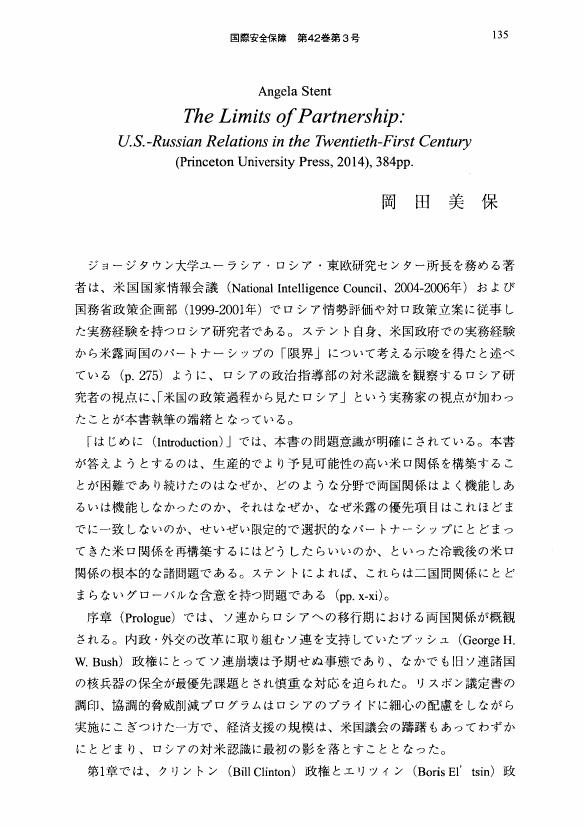1 0 0 0 OA ロシアの化学兵器廃棄をめぐる外交と内政
- 著者
- 岡田 美保
- 出版者
- ロシア・東欧学会
- 雑誌
- ロシア・東欧研究 (ISSN:13486497)
- 巻号頁・発行日
- vol.2006, no.35, pp.60-71, 2006 (Released:2010-05-31)
How the political leaders can commit themselves over the promises to abolish a specific kind of armament? By which means can they force the domestic actors or stakeholders to change their behavior?The international rules to control arms increasingly require qualified administrative management, and implementation of these rules significantly affect the interests of the domestic organizations or groups such as the military, the arms producers or the local governments and residents. So, compliance can be discussed as a matter of attaining cooperation among these domestic actors.This article examines the key sources of variation in the level of compliance by tracing the political process of the chemical weapons destruction in Russia. The recent three leaders (Mikhail Gorbachev, Boris El'tsin and Vladimir Putin) worked with different external enthusiasm and domestic political energy on the problem. This paper concludes that the most significant and direct source was the deliberate and effective handling by the leader, though the institutional changes also had limited impact on the situation.Compliance was poor, when a large majority of political energy went into bargaining with the local governments over the compensation for accepting the construction of destruction facilities, and when external commitment lacked political decisiveness to proceed against domestic resistance. Compliance was achieved, though with delay, when strong political leadership was exercised over budget allocation and over establishment of effective mechanisms of control over the local governments and the destruction troops. The case deserves serious attention, because it illustrates us that the institutional changes must be followed by strong and effective political leadership.
1 0 0 0 OA 「介入国としてのロシア」「被介入国としてのロシア」
- 著者
- 岡田 美保
- 出版者
- 国際安全保障学会
- 雑誌
- 国際安全保障 (ISSN:13467573)
- 巻号頁・発行日
- vol.45, no.2, pp.21-34, 2017-09-30 (Released:2022-04-01)
1 0 0 0 OA Bobo Lo, Russia and the New World Disorder
- 著者
- 岡田 美保
- 出版者
- 国際安全保障学会
- 雑誌
- 国際安全保障 (ISSN:13467573)
- 巻号頁・発行日
- vol.44, no.2, pp.101-105, 2016-09-30 (Released:2022-04-01)
1 0 0 0 OA Angela Stent, The Limits of Partnership: U.S.-Russian Relations in the Twentieth-First Century
- 著者
- 岡田 美保
- 出版者
- 国際安全保障学会
- 雑誌
- 国際安全保障 (ISSN:13467573)
- 巻号頁・発行日
- vol.42, no.3, pp.135-139, 2014-12-31 (Released:2022-04-07)
1 0 0 0 OA ロシアの北極政策―日本への含意
- 著者
- 岡田 美保
- 出版者
- 国際安全保障学会
- 雑誌
- 国際安全保障 (ISSN:13467573)
- 巻号頁・発行日
- vol.42, no.1, pp.37-55, 2014-06-30 (Released:2022-04-07)
1 0 0 0 OA ロシアの核戦力と新START後の軍備管理 ―到達点及び出発点としての新START―
- 著者
- 岡田 美保
- 出版者
- 国際安全保障学会
- 雑誌
- 国際安全保障 (ISSN:13467573)
- 巻号頁・発行日
- vol.39, no.1, pp.63-79, 2011-06-30 (Released:2022-04-14)
- 著者
- 岡田 美保
- 出版者
- 国際安全保障学会
- 雑誌
- 国際安全保障 (ISSN:13467573)
- 巻号頁・発行日
- vol.35, no.2, pp.155-159, 2007-09-30 (Released:2022-04-20)
1 0 0 0 OA 軍備管理条約の違反における政治と軍の関与形態 ―ソ連/ロシアと生物兵器禁止条約―
- 著者
- 岡田 美保
- 出版者
- 国際安全保障学会
- 雑誌
- 国際安全保障 (ISSN:13467573)
- 巻号頁・発行日
- vol.33, no.3, pp.103-126, 2005-12-31 (Released:2022-04-24)
1 0 0 0 OA 電子カルテ学習支援システムの開発 ―病院業務と診療情報の理解を中心として―
- 著者
- 渡辺 佳代 山本 和子 岡田 美保子 高上 僚一
- 出版者
- 一般社団法人 日本医療情報学会
- 雑誌
- 医療情報学 (ISSN:02898055)
- 巻号頁・発行日
- vol.25, no.4, pp.249-255, 2005 (Released:2015-07-17)
- 参考文献数
- 11
川崎医療福祉大学医療情報学科では,医療現場の実情に対応し得る教育を目指し,平成13年から「電子カルテ・ラボ」システムの開発を進めてきた.本システムは,電子カルテシステムが導入された場合に,これを支援する人材に必要と考えられる知識・技能を,学生が演習を通じて習得することを目的としている.システムの機能は大きく1)電子カルテシステムを中心とした機能,2)学習支援機能,3)教材作成支援機能からなる.学習支援機能は,患者の動線に沿った画面から構成される.画面ごとに,学習目標,理解を助ける解説,各部門で行う業務システムによる入力演習,確認のための試験問題を用意している.本システムを演習で使用し,学生にアンケートを実施した結果,電子カルテシステムや病院の仕組みを学ぶ上で有用であることが示された.






